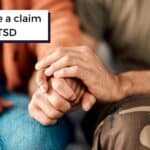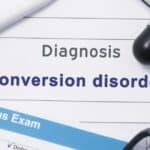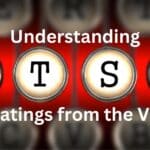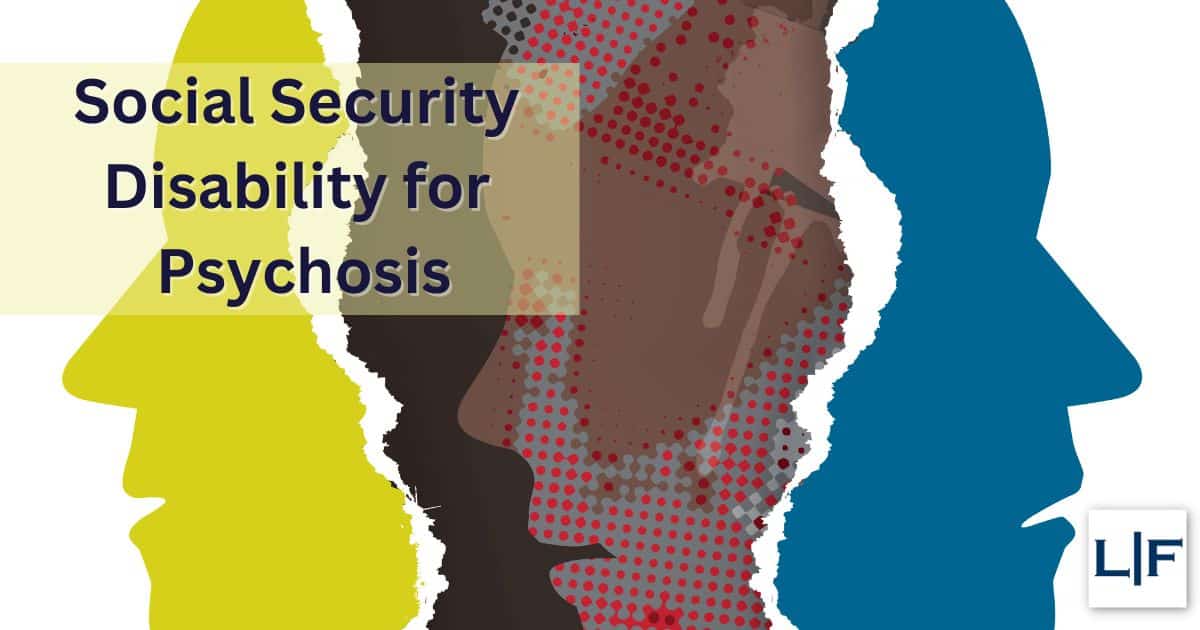Social Security Disability for psychosis may be available to someone if they are unable to work on a regular and consistent basis due to the severity of their symptoms.
Psychosis is a set of symptoms that affects people with certain mental illnesses, which can cause them to lose touch with reality. Schizophrenia and bipolar disorder are two of the most common conditions that trigger psychotic episodes. Psychosis varies in the way it manifests itself from person to person. People suffering from psychotic symptoms often experience alarming delusions and hallucinations that can severely disrupt their perceptions, thinking, emotions, and behavior.
If you or your loved one has been diagnosed with a condition related to psychosis and are no longer able to work, you may be able to qualify for Social Security disability benefits for psychosis. Our lawyers at Lunn & Forro, PLLC can answer any questions you may have about getting social security disability for psychosis.
Call our office in Raleigh at 888-966-6566 for a free consultation at your convenience. If you are uncomfortable making calls yourself, we would be happy to speak with a family member on your behalf.
In what ways can psychosis cause disability?
Psychosis comes on gradually and it may take months or years to experience pronounced diagnosable symptoms. Some of the symptoms that people with psychosis experience include:
- Hearing voices or noises that are not there
- Confused thinking, speaking in jumbled sentences
- Delusions and false irrational beliefs [e.g., paranoia (believing the government is out to get him), false inferences (thinking God is sending him messages through the TV), and grandiosity [thinking he has supernatural powers)]
- Problems with memory, attention, planning, and organization of thoughts
- Inability to read emotional and social cues
People experiencing these types of symptoms often have problems in social situations and isolate themselves from family and friends. They might not talk much because they have problems communicating their thoughts. And as the condition progresses, it becomes impossible for them to carry on with normal daily life, relationships, and their job.
Does Social Security consider psychosis a disability?
Section 12.00 Mental Disorders of the Social Security Administration’s (SSA) listing of impairments provides that certain types of “schizophrenic, paranoid, and other psychotic disorders” can qualify a claimant for disability benefits. In order to qualify for benefits, the psychotic symptoms must be severe enough to greatly impair functioning.
There are two ways to meet the SSA’s required level of severity:
Delusions or Hallucinations
You have either intermittent or continuous persistent delusions or hallucinations; “catatonic or other grossly disorganized behavior”; or “incoherence, loosening of associations, illogical thinking, or lack of content of speech”.
These symptoms must result in two or more of the following:
- Inability to continue, or restriction of, daily activities
- “Marked difficulty” engaging in social interactions, relationships, etc.
- Inability to sustain concentration, pace, etc.
- “Repeated episodes of decompensation” (i.e., failure to create and use appropriate coping mechanisms)
History of Psychotic Disorder
You have a history of some type of psychotic disorder that has lasted two years or more and that has caused substantial limitation of your ability to do basic work activities.
You also must have one of the following:
- Repeated episodes of decompensation
- A disease that would result in decompensation with the slightest change in mental demands or environmental change
- Inability to function outside a “highly supportive living arrangement” (must have lasted at least one year)
What are the criteria for disability benefits based on psychosis?
To obtain disability benefits, you must meet both disability-specific and general requirements. You need to be able to prove the following to the SSA:
- You have medically documented psychosis that fits the above criteria.
- Doctors expect your condition to last a year or longer.
- You are unable to work or engage in any substantial gainful activity, despite treatment.
- Your monthly earnings are less than SGA which is $1470 in 2023.
What if I do not meet the SSA’s disability requirements for psychosis?
Even if you do not meet the disability criteria for psychosis outlined in Section 12.00 of the listing of impairments, you may still qualify for Social Security disability benefits. You must prove that your psychosis is severe enough to prevent you from participating in substantial gainful employment.
How do I prove that I meet the disability criteria?
You will need comprehensive medical records to establish your disability. Without substantial proof of your condition and the limitations it causes in your life, the SSA will not approve your claim.
The caveat to this is that psychosis diagnoses only occur after clinical examination and reviewing the patient’s history — not with biological testing — so proving your condition may be challenging. It is in your best interest to have a lawyer assist you with gathering the records and preparing your claim so you can ensure your evidence is thorough and convincing.
When you work with Lunn & Forro, PLLC, we will help collect the records necessary to establish the evidentiary requirements for your Social Security Disability for psychosis. Some of the items we will use include:
- Your records from your medical doctors, mental health physicians, therapists, and counselors
- A Function Report, which details how your condition is affecting your activities of daily living (ADL)
- Treatment notes from your psychiatrist
- Results from psychiatric, neurological, and psychological evaluations
- Input from social workers, former employers, teachers, friends, clergy, and family members
What do I do if the SSA denied my disability claim for psychosis?
If you recently received notice that the SSA has denied your claim for disability benefits, do not lose hope. There is still an excellent chance you can win your benefits. Our Social Security disability lawyers at Lunn & Forro, PLLC can help you appeal the decision.
We can review your case and determine what caused the SSA to deny your claim. Often, the SSA rejects applications because of mistakes in the administration process, incomplete paperwork, or lack of sufficient medical evidence.
Our team of qualified and caring disability lawyers will gather the items needed and request the Administration reconsider your benefits. We can continue advocating for your rights through the many levels of appeals.
Our firm is solely dedicated to helping people living with disabilities such as psychotic disorders. We know how important benefits can be to you and your family, and we will work diligently to help you obtain them.
Call Lunn & Forro, PLLC in Raleigh today for a no-cost consult to discuss your case: 888-966-6566.
Related Posts

What are the Disability Listings for a Social Security Claim?
The disability listings can make it easier for you to qualify for Social Security disability benefits. If you are considering filing an application for Social

How do I file a VA claim for PTSD?
If you are filing a claim for PTSD, you need to complete VA form 21-0781 to submit with your application for VA compensation. This form

Can You Get Disability for Conversion Disorder?
Conversion disorder is a mental illness that causes neurological symptoms, such as paralysis or hearing loss. It is one of several conditions that fall under

Understanding VA Ratings for PTSD
If you are a veteran that lives with post-traumatic stress disorder (PTSD), you may qualify for VA disability benefits. Receiving approval for your claim can
Getting Social Security Disability for a Mental Illness
There are various mental illnesses that can qualify someone for disability benefits. In fact, approximately one-third of disability beneficiaries received a mental disorder diagnosis in
Disability for Anxiety and Panic Attacks
Disability for anxiety and panic attacks is available to individuals who cannot work due to the severity of their symptoms. Panic disorders are not uncommon.
Is BPD a Disability?
Some people who suffer from Borderline Personality Disorder qualify for disability benefits. Personality disorders are characterized by unhealthy and rigid thoughts and behaviors that greatly
Is PTSD a Disability?
Post-traumatic stress disorder (PTSD), which can develop after exposure to an extremely traumatic event, is not uncommon. According to the Department of Veterans Affairs (VA),



